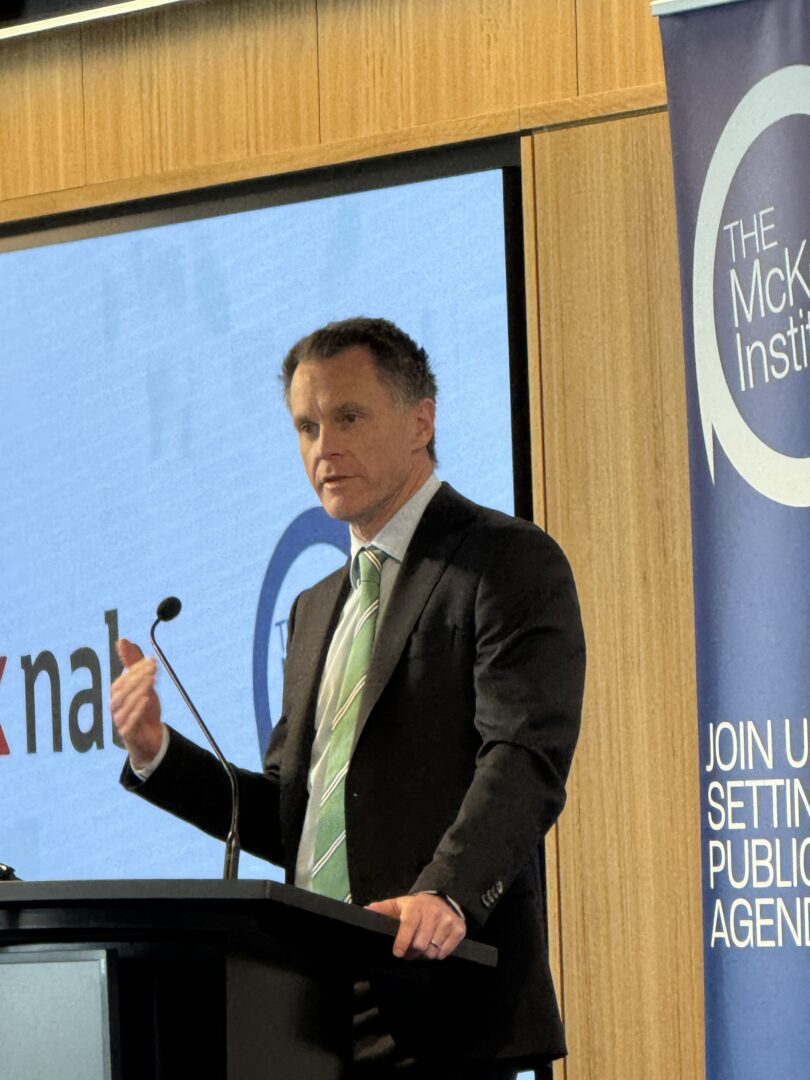NSW PREMIER CHRIS MINNS -MCKELL INSTITUTE POST BUDGET ADRESS 2025 AT NAB
National Australia Bank Building , 2 CARRINGTON STREET, SYDNEY
Wednesday, 16 JULY 2025
Media Release from Office of NSW Premier
Thanks NAB for hosting us, and thank you, McKell for organising today’s event. I’d like to acknowledge the traditional owners, the Gadigal people, and pay my respects to elders past and present, and say it’s great to be back here at McKell, the home of what I think is Labor thinking in New South Wales.
And I think I should say in that vein, that last night, I attended the 30th anniversary dinner since the election of the Carr government in 1995. And Carr said at that event, and it was an echo of a point he made in 1995, that “William McKell developed his political model and Neville Wran updated it, and then the Carr government adopted it.”



Photo credits A.Ritenis
And for all three, that New South Wales Labor model, I think, can be best summed up by our party’s mission, which is to make the country a fairer place. And I’m not here today to pay tribute to those leaders, but to explore and explain what that Labor mission to make the country a fairer place means, in the context of 2025.
For William McKell coming to power in the depths of the Second World War, it meant working with Curtin and Chifley, to supply the troops with what they needed to win the war.
It also meant establishing the New South Wales Housing Commission to win the peace and to give returning heroes and their families a place to live.
It also meant articulating and imagining what a post war economy would look like, and he did that by establishing the Coal Board, still New South Wales’ single biggest export, supporting the Snowy Hydro scheme and building new, but hugely important, public institutions like the UTS.
McKell was responding to the world that he lived in, and for us as Labor people in 2025, that world has changed, and the challenges are different. If we think about what’s holding people back right now, it’s not the same as it was in the 20th century.
When you consider the life of a young person today, what it is stopping them from living a good life, where they can meet their full potential, it is undoubtedly a decent home in a suburb close to where they work with enough free time to enjoy that with the people that they care about.
At different points in Labor’s history, the party and the union movement might have singularly focused on the inequality of the fight between capital and labour.
And I’m not suggesting that’s not important right up until today, but if you look at that young person growing up in our circumstances and consider what’s really standing in the way of their happiness, it’s that they’ve been locked out of the housing market and it’s far too hard to build homes in Australia’s largest state.
Which is all to say that the Labor mission of fairness has to keep up with the world that we live in. A world where government intervention and support for those who build in our economy can work together to make life fairer.
Whether that’s intergenerational fairness on housing and planning, or economic fairness in the workplace, or geographic fairness, depending on where you live, or basic social fairness – can you live a stable life in a safe community that gives you the confidence you need to follow your dreams and exercise your rights, your personal rights.
As a Labor government, that’s what motivates us. If you care about fairness, you have to start with the biggest problem of all, and that is housing.
We’re talking about a single problem that also undermines social mobility, makes people work longer and harder for less reward, and even in its most acute forms, can threaten faith in democracy and our system of government.
It also forces people to move away from their social networks, their family, their grandparents, their parents.
I spoke to Bernie Smith, who’s here today, who said to me not so long ago, a story of a retail worker, one of his members, who used to live around the corner from where her job was in Boronia Park.
But because of rental prices, she had to move to Kings Park, which adds – wait for this – an extra hour each way on public transport.
Think of all the time that’s been wasted for that employee, for that worker, for that member of our community, all the potential that’s being drained away sitting on a bus or a train to get to work.
All the moments being lost, either at work, getting ahead or with their family because of our failure on housing policy. So, it’s up to us, in the same way as Chifley and McKell, to start delivering for people.
And a lot has changed since the 40s, but when you get really down to it, the fundamental problem remains the same: we’re not building enough houses in our state, and we need to increase that supply.
Our budget last year announced the single biggest investment in public housing in the state’s history, $5.1 billion to build 8400 new homes. Half of which would be designated for victim survivors of domestic violence.
Now, the previous government spent 12 years selling off over $3 billion worth of public housing to the point where there were fewer of them at the end of their term in office than there were at the beginning.
And that can’t be our approach if we live in as we do, the second, potentially first, most expensive city on Earth.
As we see it, it’s not a matter of public versus private. We need every sector working at full capacity, pulling in the same direction.
This is where we differ from other political parties. And I’m going to be honest with you about the Greens, because we understand the reality that there is a massive role here for the private industry, supporting government planning decisions, putting their own capital on the line, building homes for the next generation.
I think it’s where we differ from other political parties in New South Wales as well, who seem to want to preserve Sydney as if it was a national museum, while also adding another street to the western fringe of Sydney every other week.
But that just won’t work.
We want to be a party that’s building public housing, supporting new private developments, more homes around train stations, more terraces, more townhouses, yes, more apartment buildings.
We want that to be successful because we believe it’s the only pathway to reverse what the productivity commissioner has identified as “a city without grandchildren.”
We lose twice as many young people as we gain every 12 months.
And that’s particularly galling when you consider that Sydney and New South Wales is the entry point for 38, 39% of inbound migrants, most of them are young people.
So even considering we accept more migrants from around the world who are predominantly young people, we still lose twice as many young people a year as we gain.
And think about the families, the businesses, the opportunities, the little soccer clubs and sporting organisations, the presidents of the P&Cs that all go begging because we’re not building enough houses in Sydney.
We want to turn that around. I want to make it core Labor business.
My ultimate aim is that other political parties join us, either in a bipartisan change to the Planning Act that we can push through the parliament.
But if it’s only going to be us, that’s fine too, because we will take it to the election campaign and earn a mandate for major change in New South Wales when it comes to planning for, as I said, the most expensive city on Earth.
The second element I wanted to speak about was the removal of the wages cap in our state.
It’s been a difficult decision for the government to take, but the right decision and perhaps our most important decision, I don’t resolve from it for a second.
We were faced with a situation where in our core front line public services, we had more resignations than retirements. For the first time in the history of police, for the first time in the history of the Department of Education, for the first time in the history of nursing in the state.
People up and leaving, changing professions or leaving altogether because they couldn’t pay the rent, couldn’t pay their mortgage, didn’t want to stay in the New South Wales system.
Something needed to change, and when we took that to the election campaign and earned a mandate for it, we were roundly criticised for those changes as economically irresponsible, reckless to the budget and damaging to the prevailing economic circumstances, in particular, inflation.
But I can report to all of you that as a result of those changes, we have got school teachers that have gone from the worst paid in the country to the best paid in the country.
A direct result of that has meant that rather than having 10,000 cancelled or merged classes in our public schools every single day, we’ve got that to below 5000.
And I know what you’re thinking, I know that when you were all in school, and when the teacher didn’t turn up, substitute teacher came in, and it was great fun, because you could make fun with a substitute teacher and muck around.
Unfortunately, cancelled or merged classes means there was no teacher available. So, kids were playing sport on the back fields or merged in with another class.
And the only way around that was to keep more teachers this most important of vocations in the profession for longer. That’s exactly what we’ve done with Prue Car’s changes to the wages cap and for our agreement with the Teachers Federation in the state.
It’s a similar story for police. In my first attestation at the Golden Academy, there was 34 or 35 graduates for the New South Wales Police Academy.
Working with the Police Association and the union, at the last attestation, it was full for the first time in many, many years in New South Wales. And those police recruits will start their careers right across New South Wales.
And attracted for two things. Firstly, wages cap removed, and secondly, we’re paying recruits to learn become a police officer at the Goulburn Academy.
And that’s meant that people that were considering becoming police officers, but perhaps had a career or profession or obligations or a family, could make the decision to become a police officer without having to burn three months of salary.
So, we’re seeing different quality of calibre of candidate going through the Goulburn Academy. It’s made a major difference.
We wouldn’t have been able to do it without our agreement with the Police Association, without our decision to remove the wages cap.
So what’s it meant for the budget? Well, the year before we were elected, previous government knocked up a $15 billion deficit.
At the budget we handed down several weeks ago, we’ve got that to just over 5 billion, and we’re projecting a surplus in the years ahead. In two years’ time, we will have the lowest debt as a percentage of our GSP of any state other than Western Australia.
It’s also meant that when the government took office, inflation was running at 7.8%, now around 2.1%. Real wages are growing, and our expenses are lower than the previous government.
So, we’ve got a long way to go, I’m not suggesting that the job is over, but the decisions that were made have meant better quality public services in New South Wales, attracting more people to essential jobs like school teachers, police officers, nurses and paramedics, and at the same time, responsible economic management.
We believe it comes down to basic fairness. The third question of fairness we’re trying to tackle as part of the budget in the last year and a bit before the election, has to do with the fairness of geography, of where you live, and the quality of life that comes with it.
Now that’s not a new development. We’ve had fibros and silver tails as a story in Sydney for a long period of time, and Gough Whitlam once argued while running for prime minister. He said:
“Increasingly, a citizen’s real standard of living, the health of himself and his family, his children’s opportunities for education and self-improvement, his access to employment opportunities, ability to enjoy the nation’s resources for recreation and culture. Their ability to participate in the decisions and actions of their community is not determined by their income, not by the hours that they work, but where they live.”
And that was true in 1972 it’s even more true in 2025 particularly if you live in the fast-growing areas of Greater Sydney.
I’m speaking in particular of North West and South Western Sydney, where we’re seeing rapid changes. Suburbs like Riverstone, Gables, Box Hill in the north, Wilton, Austral, Edmondson Park in the South. Some of these places, five years ago, you may have been standing in a paddock, and now there’s 1000s of houses and 1000s of families.
There’s some great things about these communities. They are vibrant. They’re full of entrepreneurs. There are soccer and cricket clubs popping up every other weekend.
They’re a fun, great place to be. They’re also on the doorstep of some of the most beautiful nature anywhere in the country. It’s a great place to raise your family. It’s a wonderful place to have kids, and it’s more affordable than other parts of Sydney.
The problem is, as we’ve seen this radical demographic change, we’ve also seen infrastructure not keeping up to service that population.
And I’m talking about the basics, like having a public school ready to go. When a new family moves into a new housing subdivision, more often than not, there’ll be children in that house, and more often than not, the New South Wales government, under various guises, haven’t provided schools for those children.
So, we want to make sure that that’s part of rebalancing the growth in the city, so the East and the North take their fair share, but we’ve got infrastructure for the West as well.
It’s also prioritising infrastructure for those fast-growing places, so a child out in Gregory Hills attends a permanent school, not a temporary school. With peers that he can grow or she can grow through primary school, preschool and then into high school.
Now the Deputy Premier, the Minister for Education, Prue Car, is currently investing $3.9 billion to upgrade and build these schools.
These are new schools in Sydney that many people may not have heard of, but it’s Box Hill, Emerald Hills, Gables, Grantham Farm, Nirimba Fields, Tallawong and Wilton. 600 new permanent classrooms in the North West of Sydney alone.
And that includes Rouse Hill Hospital, which is a $900 million project jointly funded with the Commonwealth.
Look, I could go on and on, but what my point here is we need to make sure that we’re putting fairness in the middle of the decisions that we’re making, fairness for housing fairness for those that work and provide the services for taxpayers in this state, and fairness based on your geography.
That’s particularly true of regional New South Wales as well, where we’re building Eurobodalla Hospital, Shoalhaven Hospital, major health resources in areas that have an aging population, but nowhere near enough of the essential health infrastructure that they require.
All of it, we hope, builds a fairer New South Wales where everyone has a chance to live a good life, in a decent home with a well-paying job, and in the end, write their chapter in the history of this great city and this wonderful state.







